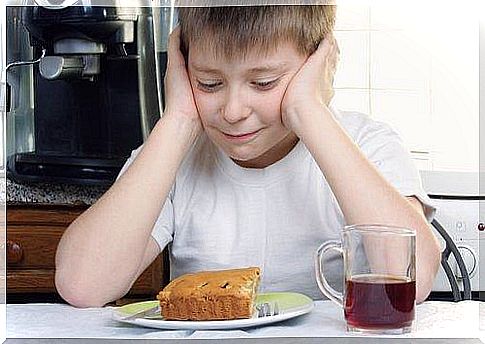What Is An Avoidant/restrictive Food Intake Disorder?

Usually occurring in children, avoidant/restrictive food intake disorder (ARFID) is when a person suddenly stops eating certain foods or eats only a small amount. It can cause many future problems. Consider, for example, anorexia or bulimia. Read more about this condition in this article.
What is Avoidant/Restrictive Food Intake Disorder?

It is a disease that begins in childhood. It’s about avoiding or reducing the intake of certain foods.
It often starts as a parental accepted behavior. Or it is even behavior directed by them so that they have no trouble cooking meals, or so as not to waste time they let them choose their own food. However, it can cause many problems in the development of the child.
Due to whim or bad manners, an avoidant/restrictive food intake disorder leads children to eat only what they want. They don’t accept food that ‘they don’t like’.
In most cases, “approved” meals include burgers, fries, pastries, and pizzas. ‘Unapproved’ foods are fruits and vegetables.
Many children will only feed on junk food and will never try broccoli, apples or lentils.

We should add that this disorder leads to nutritional deficiencies. The child does not consume the sufficient vitamins, proteins and nutrients that the body needs.
An avoidant/restrictive food intake disorder can be ‘masked’ by a so-called freedom of the child to eat what he likes. But although the child does not want to eat fruit, he must do so for his own sake and for better development and growth.
A person’s future depends on what he eats during his childhood. A child who is a ‘picky’ eater will:
- having poor performance in school
- being sick often
- have a short build
Avoidant/restrictive food intake disorder is a psychological problem

This condition is automatically associated with a nutritional problem and lack of nutrients.
However, it can also be associated with bulimia and anorexia because it is a syndrome that requires medical attention.
Because of this fact, it is necessary for children who refuse to eat certain foods, despite their parents insisting that they eat them, to see a therapist. A nutritionist or pediatrician should also evaluate the child.
Children use these food choices to express themselves or to communicate. ‘ Between the lines’ there is a core problem that needs to be addressed.
Crying behind a plate of beets, spitting out the food because it has carrots in it, or screaming during dinner. They are worn which can be stressful for the parents.
Not wanting to see their children suffer, they choose to cook only what they want. While the parents’ attitudes and intentions are well-intentioned, they do more harm than they think.
The problem will escalate and before you know it, your child will only want to eat two or three things.
How do I discover the disorder in my child?

It is more common in boys than girls. In addition to not wanting to eat certain foods, other symptoms occur:
- Anxiety Problems
- Social isolation
- Obsessive and Compulsive Traits
- Low adaptive capacity
- Irritability and mood swings
- Uncontrollable crying or screaming
- Nutritional Deficiencies and Weight Loss
- Slow development or growth
What causes it and how can we avoid it?

There is not one particular trigger for this syndrome. However, parent-child bonding issues can cause it.
One of the ways to express their dissatisfaction, get attention, or ask for affection is by choosing their food or crying during meals.
Stress, trauma, or lack of parental care can also trigger this problem.
However, overprotection can also cause this condition. Children who don’t accept ‘no’ for an answer and do whatever they want may be suffering from this condition.
Other causes
Other causes of this syndrome are:
- do not set rules or limits.
- compensation for a lack of attention or time through all kinds of allowances or gifts.
To avoid texts like “I don’t like this”, “I’m not eating this” or “I don’t want this” while eating, parents or caregivers need to be smart and patient.
When they say “no” the first time, threatening them or saying things like “You’re going to eat this because I say so” is n’t really the right way.
It is good to know that children imitate their parents and the adults around them .

Therefore, if the mother, father or older brother selects the food on their plate or says that they do not like certain things, the child will certainly reject those same foods as well.
The family’s diet should consist of all kinds of ingredients. For example, if a parent needs a different menu, either involve the child in this process or cut them out of the conversation completely.
Trying different recipes, preparing fun and colorful dishes, and encouraging them to cook are all excellent ways to teach your kids to eat all kinds of foods.
Offering them fruits and vegetables from childhood and not always giving them carbohydrates, fats and sugars will help improve their health, achieve better development and help prevent eating disorders.









